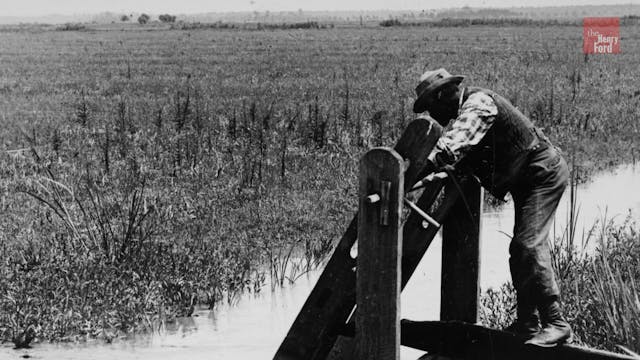How Farmers Harvested and Threshed Wheat in the 1880s
19th Century
•
2m 0s
Lazy days of summer start for some farmers only after they finish the most stressful time of their year – grain harvest. Weather conditions dictated the timing historically (and continue to do so today). At Firestone Farm, you can see the ways that farmers such as Benjamin Firestone combined weather, human labor, draft-horse power, and self-raking reaper, to harvest the Turkey Red Winter Wheat crop during July 1886.
The Turkey Red winter wheat grown at Firestone Farm is a non-hybrid wheat that is planted in the fall and harvested in mid-summer. Featured in this video is a Johnston Self-raking reaper. It does not bind the wheat like later binder reapers so farmers would have to follow behind and hand tie the wheat into sheaves by hand.
The advent of threshing machines reduced the physical labor of removing the wheat grain from the straw. Thresher-separators threshed the harvested grain, removing the grain and chaff (waste) from the straw, and then winnowed the chaff from the grain, all in a continuous flow. These implements also greatly reduced the time required for harvest, increasing yields, while reducing the labor costs.
Up Next in 19th Century
-
Napoleon's Revenge: Wagram 1809
Six weeks after his bloody repulse at the Battle of Aspern-Essling, Napoleon led his reinforced army back across the Danube. The resulting clash with Archduke Charles's Austrian army was the biggest and bloodiest battle yet seen in European history, and despite heavy French losses, resulted in a ...
-
Napoleon's Spanish Ulcer: Spain 1809 ...
In 1809, as Napoleon fought the Austrians at Wagram, the war in Spain and Portugal continued to rage. The French had inflicted several heavy defeats on Spanish field armies, but now they faced a popular insurgency as well as a well-trained Anglo-Portuguese army led by British general Lord Welling...
-
History of African American Farm Fami...
Through the lens of historic photographs, we learn a story of African American history. Today, African Americans in United States agriculture are virtually non-existent, and in a world of mechanized industrial farming, it is easy to forget the hands-on physical labor required in the past. The ric...


